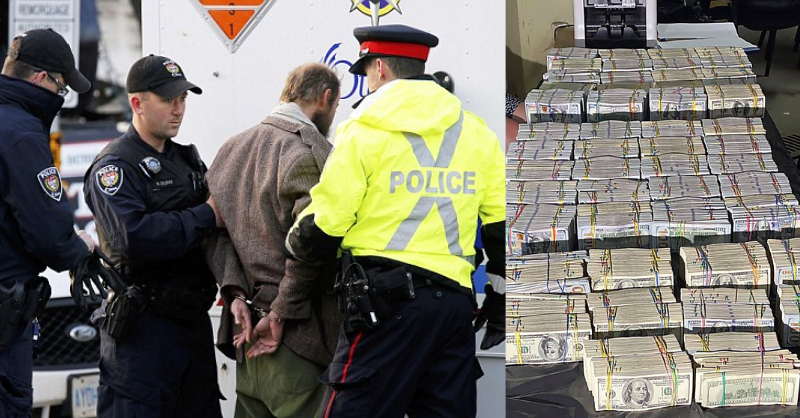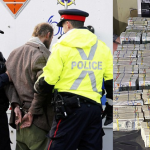In a dramatic and mysterious turn of events at Winnipeg James Armstrong Richardson International Airport, Canadian authorities seized a suitcase containing a staggering $450,000 in cash on October 26, 2024. The arrest, carried out by the Royal Canadian Mounted Police (RCMP), quickly became a focal point of national attention due to the sheer amount of money involved and the lingering questions surrounding its origin.
The individual arrested in connection with the cash is a 30-year-old man from Calgary, Alberta, who had been preparing to board a flight to Toronto. The RCMP has not yet publicly released his name, citing the ongoing nature of the investigation. However, what is known is that the suitcase full of banknotes triggered alarms during a standard security screening conducted by the Canadian Air Transport Security Authority (CATSA).
According to an RCMP news release dated October 30, 2024, security officials discovered the cash during X-ray screening of luggage. Upon opening the suitcase, authorities found carefully bundled stacks of Canadian currency, totaling nearly half a million dollars. Airport police immediately detained the individual, who reportedly offered no clear explanation for the source or intended use of the cash.
“This kind of amount being transported without documentation or explanation is highly unusual and concerning,” an RCMP spokesperson stated. “We are treating this case seriously and continuing to investigate all possible leads.”
Legal Background: What Are the “Proceeds of Crime”?
The man has been released pending a court appearance on February 3, 2025, in Winnipeg. He faces potential charges under Canada’s Criminal Code, specifically under laws dealing with the possession of proceeds of crime.
In Canadian law, “proceeds of crime” refer to any property or assets that can reasonably be believed to originate from illegal activity. When a person is found with large sums of money and cannot account for them with valid documentation — such as bank withdrawal receipts, business transactions, or other legitimate sources — the burden of proof often shifts to the defendant.
Canadian police and federal agencies, including the Financial Transactions and Reports Analysis Centre of Canada (FINTRAC), closely monitor suspicious cash activity. In cases like this, authorities may seize the money temporarily while investigating whether the funds are tied to organized crime, drug trafficking, tax evasion, or other illegal enterprises.
Why Travel With So Much Cash?
The case has raised eyebrows and sparked widespread curiosity: Why would someone attempt to fly domestically with such a large sum of money — $450,000 in physical currency — with no supporting documentation?
Experts in financial crime suggest several potential motives, including:
- Avoiding electronic trails: Criminal organizations often use bulk cash transactions to avoid detection by banks or government regulators.
- Money laundering: Flying across provinces might be part of a strategy to integrate illicit funds into the legal economy.
- Drug or gambling profits: Cash is still a preferred form of payment in underground economies, especially for high-stakes illegal gambling or narcotics sales.
“There is no innocent explanation for carrying that much currency in a suitcase without paperwork,” said a former RCMP financial crimes investigator. “It screams money laundering, especially when the person can’t explain where it came from.”
Airport Security as the First Line of Defense
This case is also a reminder of the evolving role of airport security and law enforcement. While the primary function of CATSA is to ensure the safety of passengers and detect dangerous items, they are increasingly trained to detect financial crimes and suspicious behavior related to terrorism financing and smuggling.
Thanks to routine screening and thorough inspection protocols, officers were able to flag this case before the individual boarded the plane. The situation could have gone entirely unnoticed if not for Canada’s strict protocols regarding large sums of cash and the vigilant cooperation between CATSA and RCMP units.
How Often Does This Happen?
Although the $450,000 seizure in Winnipeg stands out due to its size, such incidents are not entirely rare in Canada. Over the past decade, law enforcement agencies across the country have reported multiple cases of individuals attempting to transport large amounts of undeclared cash, either domestically or across borders.
For instance:
- In 2022, police in Vancouver seized over $1 million in undeclared cash during an operation at a private airport.
- In Toronto, authorities regularly intercept individuals moving $50,000 to $200,000 in bulk cash during high-risk flights.
Still, a single person flying domestically with nearly half a million dollars is highly unusual and raises red flags.
What Happens Next?
The suspect is currently not charged, but he is under formal investigation. If police determine that the funds are indeed proceeds of crime, the money may be permanently forfeited to the Crown under Canada’s seizure and forfeiture laws.
If, on the other hand, the individual can prove the money was obtained legally — such as from the sale of a home, business earnings, or inheritance — and that he had a valid reason for transporting it in cash, the funds may be returned. But such a defense would likely require substantial documentation, including tax records, contracts, and bank statements.
In addition to court proceedings, the case may involve deeper financial audits, surveillance of potential accomplices, and review of cross-provincial financial activity.
Public Reaction and Ongoing Mystery
The public reaction to this story has ranged from amusement to concern. Social media users have speculated wildly about the origins of the money — from drug trafficking to crypto laundering to underground casinos.
Some users jokingly asked whether the man was simply trying to “avoid ATM fees.” Others raised serious questions about whether the suspect was a courier for a larger criminal network.
As of now, RCMP has released no additional information regarding whether other individuals are suspected or if this case is tied to a broader investigation.
Conclusion: A High-Stakes Mystery Still Unfolding
This incident at Winnipeg Airport highlights the intersection of routine airport screening, financial law enforcement, and criminal investigation in Canada. It also serves as a reminder of how easily someone can be caught in legal jeopardy when handling large amounts of money in suspicious ways.
The mystery remains: Who was this man? Where did the $450,000 come from? And what was he planning to do with it?
The answers, investigators hope, will come to light as the RCMP continues its probe in the coming weeks and months.







